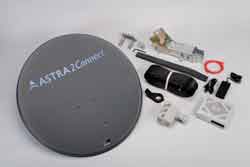Decent broadband in the countryside – what are the options?

* We have added a couple of new companies since this article was first published – AccessBB (wireless provider) and BroadbandWherever (satellite provider). See below for details…
Struggling to get a decent broadband speed down your BT phone line? David Cousins looked at the alternatives
What’s the problem?
There are loads of advantages to living in the countryside – space, fresh air, less traffic – but 21st century communications isn’t one of them. That BT phone wire that meanders its way along your farm track to the farmhouse is one problem. The lack of mobile phone masts and other wireless infrastructure in country areas is another.
Together, they mean that while city dwellers are now able to enjoy Porsche 911-type broadband speeds up to 20Mbps (Megabits/sec), you’ll probably be lucky if BT offers more than a Morris-Minor-on-a-cold-morning 0.5Mbps.
Does it matter?
Maybe not in the past, but most websites now assume that the people viewing them have decent broadband. So whether you’re surfing the DEFRA website, sending cattle passport info over the British Cattle Movement Service, getting your car tax disc online or trying to placate your 14-year-old who’s moaning that his homework is taking ages, slow broadband (let alone old-fashioned dial-up) is a pain.
And if you’ve converted barns to offices, your tenants will almost certainly insist on a decent broadband speed.
Will things get better?
Things have improved in the past few years as BT extended broadband to its smaller exchanges. But anyone more than five or six miles from their nearest telephone exchange is still a bit snookered. The government has said it plans to give everyone a 2Mbps broadband speed, but the cost of upgrading a wire that goes to just a couple of isolated farms suggests that target won’t be met.
So is all lost?
Not at all, in fact there are three or four options you should explore before giving up. These divide up into (1) wireless-delivered broadband, (2) satellite-delivered broadband and (3) 3G-delivered mobile broadband, all of them neatly circumventing those 1950s BT copper wires.
What’s wireless broadband?
Wireless-delivered broadband involves commercial companies (or local communities) taking the broadband signal from BT, then transmitting from their own mast. The wireless signal is line-of-sight and doesn’t like buildings and trees getting in the way, so it is often picked up by an antenna on top of a tall farm building or grain bin.
Is it expensive?
More than standard down-the-wire £15 a month packages from BT, Virgin, Tiscali or whoever. You’ll often pay an installation fee that varies from about £60 up to £250. Monthly subs are a bit higher, too; £30 a month is an average for 1Mbps or 2Mbps but some go as low as £5 a month.
Anything I should watch out for?
Not too much. Some cheaper packages will have a data cap on them (typically 6GB or 10GB), beyond which you’ll pay penalty charges. Check, too, how quickly they will come out to fix problems. If you’re supplying broadband to tenants in your converted barns and the connection goes down, they won’t be too pleased when you tell them it’ll be a couple of days before someone comes out.
Bear in mind, too, that wireless broadband can be a bit higher maintenance than the sort that comes down the phone line.
Sounds OK. Who’s my nearest provider?
Wireless broadband providers are a bit thin on the ground and many went bust a few years ago when BT started upgrading rural exchanges. There’s no official directory of them, but our list gives you the main ones.
There are also many community broadband providers around the country that serve a single village or town, so it’s worth asking the local council if they know of one.
I can’t find any wireless providers near me.
Don’t panic. If you can find 10 or so farms and rural households in a 10-mile radius of you in the same situation, there are quite a few wireless providers who might well find it worthwhile to put up a mast to serve all of you. In fact many will use a farmer’s dutch barn or outdoor grain bin to site the aerial that will then send the signal on to 10 or 20 other houses or businesses (and give the host farmer a free sub).
Some companies will even provide you with an individual wireless link from the nearest broadband cable to your farm, though expect to be charged £2000 or so for the privilege.
So what about satellite broadband?

If you really are out in the wilds, satellite broadband may be the only option, but it can be expensive both in equipment and monthly subscription terms. It also tends to to suffer from a small (1-second) lag, which may rule out gaming over the internet or using the BBC iPlayer. But you can use the same dish to pick up TV via Freesat, though you’ll pay a bit extra for the adapter.
There are two sorts of satellite broadband – one way (which downloads via the satellite link, but uploads via your phone line at dialup speed) or two-way (which downloads via the satellite link). Two-way is obviously preferable, but more expensive.
Who are the best-known suppliers?
AVC, the biggest operator, charges £900 for the 75cm dish, £275 for installation and then £159 a month for two-way 1Mbps broadband speed.
Beyondsl, which uses the new Astra satellite, looks somewhat cheaper. The 79cm dish and associated kit costs £300 and you can install it yourself. Then there’s a one-off connection charge of £50 and subscription charges are £40 a month for a two-way 1Mbps broadband and £80 for 2Mbps.
BeyondSL do have a fair usage policy whereby the first 1.4GB of data (for the 1Mbps service) and 2GB (for the 2Mbps service) downloaded go at full speed, but anything after 5GB will download more slowly.
Ethnet offers a range of packages for its Tooway service. These start at £29/month + £800 for installation. Speeds are up to 3.6mbps download and 384kbps upload. There’s a data cap of 2.4GB/month.
BroadbandWherever quote prices that go from £30/month + £600 installation for an up-to-3.6mbps-speed connection. Data cap is 2.4GB
What about mobile broadband over the 3G network – might that work?
Getting your broadband over the 3G mobile phone network is certainly possible, but location is the key. The theory is simple – pay £10-£15 a month to Vodafone, 02, T-mobile or 3 and they’ll give you a USB modem (often called a dongle) that plugs into your desktop or laptop. Switch it on and off you go.
That might be fine in the centre of a big city, but in the countryside it’s often a different matter. You could well find that the signal simply isn’t strong enough (or reliable enough) for day-in, day-out use. Also, most contracts have data caps (so probably no good for those tenants) and a single modem can only run one desktop or laptop at a time unless you buy a special router.
How do I find out whether it’s a good signal without committing myself to an annual contract?
The best bet is to study the coverage maps on the mobile phone companies’ websites, though bear in mind that they tend to be a bit over-optimistic.
When you’ve established what looks like the best signal strength, either find a friend or neighbour who has a laptop running mobile broadband on that network and see what speed you get on your own farm.
Or sign up to pay-as-you-go mobile broadband, which avoids having to commit to a contract and gives you a chance to see if it’s up to scratch. Vodafone, for example, will sell you a dongle for £39 and then charges £15/GB, T-mobile charges £29 for a dongle and then £2 a day, while 3 charges £39 for the dongle and £15 for 30 days’ usage. If you find you get a good speed, you can then sign up for a standard contract.
Commercial wireless broadband providers • Air-Band 0800 035 0025. Herefordshire, Worcestershire, south Shropshire, south Warwickshire. Installation £85. Residential 1-2Mbps 10GB usage cap – £20 a month. Business with 1-2Mbps, no cap and 8 hour callout for problems £49 a month • Air-Zone 0870 199 9045. Essex, Hertfordshire, Cambridgeshire, Suffolk. £250 installation, 2Mbps £30 a month • Kijoma 0121 288 1283. Large parts of Sussex, south Surrey and parts of Hampshire. Installation: £175-£300. Packages: £15-£30/month • Cotswold Wireless 0870 7609 535 Most of Gloucestershire, plus Swindon/Malmesbury area of Wiltshire. Installation £50-100. Packages from £15-30 a month • INE 0871 288 2106. Most of Nottinghamshire plus Lincolnshire borders. Installation £49. 1Mbps £16 a month, 3-4Mbps £25 a month. No data caps • Speednet Scotland 07787 121 455. Based in Troon, but coverage over much of Scotland. One-off installations possible if several people signing up • Turboweb 0845 004 1766. Isle of Wight + south coast. Installation £60. £4.99 a month light-use package with 1GB cap; £30 a month no cap. • W3Z 01773 570123. Most of Derbyshire. Free installation, 1Mbps package with 6GB data cap for £19.99 a month • These are the ones we managed to track down and contact by phone. If you use (or know of) a wireless broadband provider that’s not on this list, please, please email David Cousins at Farmers Weekly or ring 020 8652 4901 Satellite broadband providers BeyondSL 08703 82 50 42 BroadbandWherever 0800 068 3358
* AccessBB 0800 635 3535 West Midlands and Wales. Home package: 1Mbps £29 a month + £73 installation. 2Mbps £39 a month + £48 installation. Business package: 1Mbps £50 a month + £75 installation. 2Mbps £65 a month + £50 installation.
AVC 0845 386 9987
Ethnet 01763 250418

